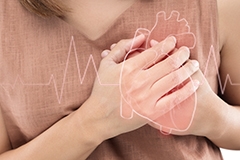Heart Attack Risk Factors That Are Riskier for Women than Men
Medically Reviewed by Alan M. Blaker, MD
If you made a list of the heart attack risk factors for men and, then, a list for women, the two would look very similar. Yet, there are some items on those lists, which leave women more at risk than men for a heart attack.
“For many years, the study of heart attacks involved only men, because researchers felt that women’s hearts were the same as men,” says McLeod Cardiologist Dr. Alan Blaker. “Once women were more closely studied, at least three risk factors were found to affect women more than men.”
THE RISKIER RISK FACTORS
A study of half a million people revealed that a woman with high blood pressure was 83 percent more at risk of a heart attack than a man with high blood pressure. For women with Type 2 Diabetes, the risk of a heart attack was 55 percent higher than a male diabetes patient. And smoking heightened a woman’s risk of heart attack 55 percent more than a male smoker.
A decline in the natural hormone estrogen may be a factor in heart disease increase among post-menopausal women. Estrogen is believed to have a positive effect on the inner layers of the coronary arteries helping to keep the blood vessels flexible. That means they can relax and expand to accommodate blood flow.
Despite the benefits of estrogen, the American Heart Association recommends against using postmenopausal hormone therapy to reduce the risk of coronary heart disease or stroke because the results of some studies indicate it does not appear to reduce the risk.
A woman can reduce her risk and increase her cardiac health by following the guidelines below.
YOUR IDEAL CARDIOVASCULAR HEALTH
Although we don’t live in a perfect world, we do know what perfection is. In bowling it’s a 300 score. In baseball, it’s a no-hitter. For women, here’s what the American Heart Association describes as “ideal cardiovascular health”:
- Absence of cardiovascular disease
- Body Mass Index (BMI) of less than 25
- Total cholesterol of less than 200
- Blood Pressure below 120/80
- Fasting blood glucose of less than 100
- Regular (of at least moderate) activity 150 minutes a week
- Abstinence from smoking
- Healthy diet with at least 4 of the recommended components
ONE MONTH WARNING SIGNS
Don’t despair if you aren’t in ideal cardiovascular health. Some risk factors you can’t change, such as your family history of heart problems and your age. In the survey below, you’ll see the percent of women who felt a certain symptom as much as one month before their heart attack:
Unusual fatigue 71% of women who suffered a heart attack felt this symptom 30-days before.
Sleep Disturbance 48%
Shortness of Breath 42%
Indigestion 39%
Anxiety 36%
Heart Racing 27%
Arms Weak & Heavy 25%
ACTION YOU CAN TAKE
Don’t panic if you experience just one of these. We all have trouble sleeping now and then or get indigestion or have anxiety. However, if you are experiencing two or more, it’s probably wise to see a cardiologist.
Find a McLeod cardiologist near you.
Sources include: McLeod Health, British Medical Journal, Harvard Medical School, American Heart Association
-
McLEOD REGIONAL MEDICAL CENTER FLORENCE
843-777-2000 -
McLEOD DARLINGTON
843-777-1100 -
McLEOD DILLON
843-774-4111 -
McLEOD LORIS
843-716-7000 -
McLEOD SEACOAST
843-390-8100 -
McLEOD CHERAW
843-537-7881 -
McLEOD CLARENDON
803-433-3000



-
McLEOD REGIONAL MEDICAL CENTER FLORENCE
843-777-2000 -
McLEOD DARLINGTON
843-777-1100 -
McLEOD DILLON
843-774-4111 -
McLEOD LORIS
843-716-7000 -
McLEOD SEACOAST
843-390-8100 -
McLEOD CHERAW
843-537-7881 -
McLEOD CLARENDON
803-433-3000
 Find a Doctor
Find a Doctor  Locations
Locations  Services
Services 